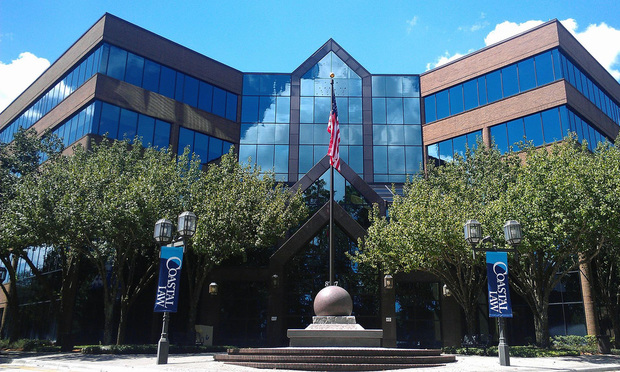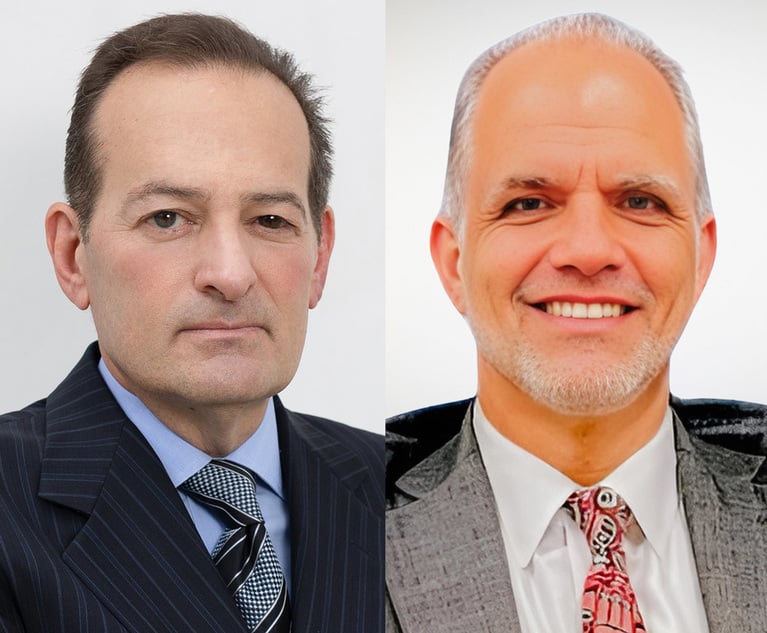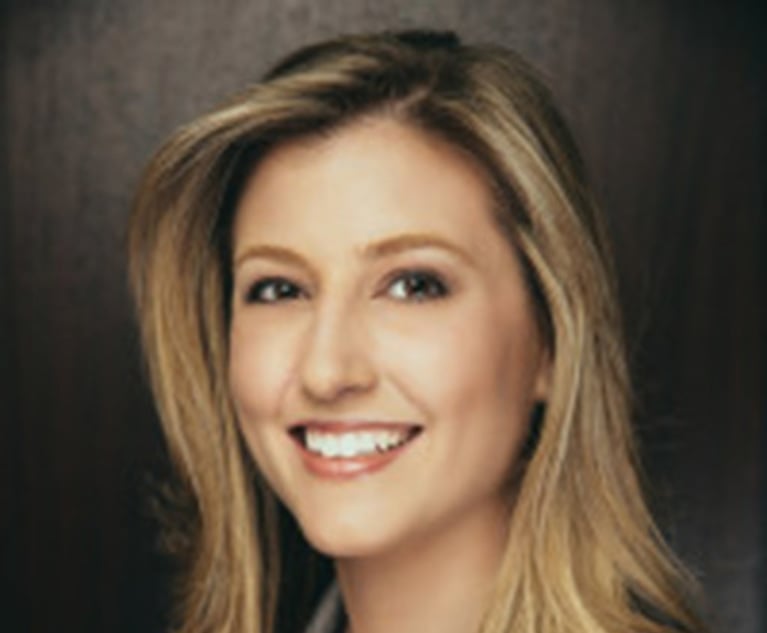Florida Coastal School of Law Sues ABA Over Accreditation Dispute
Florida Coastal alleges that the ABA told school officials in April that, while the school met its general accreditation standards, it continued to fall short of standards because of what were described as lax admission standards and a subpar ability to prepare students for bar exams.
May 10, 2018 at 05:46 PM
3 minute read

Florida Coastal School of Law filed a lawsuit Thursday against the American Bar Association over the ABA's apparent threat to withdraw its accreditation.
Florida Coastal, based in Jacksonville, filed the action in the Middle District of Florida. It is a privately run, for-profit law school, owned and operated by Naples-based InfiLaw Systems, which also operates Arizona Summit Law School in Phoenix and Charlotte School of Law in Charlotte, North Carolina.
In the suit, Florida Coastal alleges that the ABA told school officials in April that, while the school met its general accreditation standards, it continued to fall short of standards because of what were described as lax admission standards and a subpar ability to prepare students for bar exams. The school received a letter of noncompliance from the ABA late last year, but said at the time it was addressing the concerns raised, according to a Daily Business Review report that noted of 10 law schools disciplined by the ABA since August 2016, half were for-profit institutions.
Florida Coastal has retained legal heavyweights formerly of the administration of President George W. Bush: Paul Clement, his solicitor general; former U.S. Assistant Attorney General Viet Dinh; and H. Christopher Bartolomucci, associate counsel to the Bush White House. All three are with Kirkland & Ellis in Washington, D.C.
“The complaint filed today in federal court alleges that the actions the ABA took against the law school were arbitrary and capricious, and violated the due process required of those wielding accreditation power,” Clement said in a statement.
“Florida Coastal has repeatedly asked the ABA for clarification, specificity and definition regarding specific actions it must take to demonstrate compliance with the association's standards, but the ABA has declined to provide such guidance,” Clement added.
The ABA declined to comment, citing its policy of not commenting on pending litigation.
Like many for-profit law schools, Florida Coastal has long been criticized by traditional legal education institutions because of its business model.
In the lawsuit, Florida Coastal said it has been unfairly singled out because of an open-admissions policy.
“As a law school, Florida Coastal is committed to the professional preparation of its students, service to underserved communities, and accountability of the faculty for student learning outcomes,” the complaint says.
“The law school provides opportunities for persons who, because of background, status, or historical disadvantages, may have limited access to legal education,” the lawsuit says. “The law school strives to play a leading role in diversity in what remains America's least diverse profession.”
The law school says it has about 55 faculty members and about 650 students.
NOT FOR REPRINT
© 2025 ALM Global, LLC, All Rights Reserved. Request academic re-use from www.copyright.com. All other uses, submit a request to [email protected]. For more information visit Asset & Logo Licensing.
You Might Like
View All
Counterpoint: FLA Is Committed To the Success of Legal Professionals

Florida Lawyers Assistance in Need of Reform for Fairer Mental Health, Substance Abuse Monitoring
6 minute read

Trending Stories
- 1Public Notices/Calendars
- 2Wednesday Newspaper
- 3Decision of the Day: Qui Tam Relators Do Not Plausibly Claim Firm Avoided Tax Obligations Through Visa Applications, Circuit Finds
- 4Judicial Ethics Opinion 24-116
- 5Big Law Firms Sheppard Mullin, Morgan Lewis and Baker Botts Add Partners in Houston
Who Got The Work
J. Brugh Lower of Gibbons has entered an appearance for industrial equipment supplier Devco Corporation in a pending trademark infringement lawsuit. The suit, accusing the defendant of selling knock-off Graco products, was filed Dec. 18 in New Jersey District Court by Rivkin Radler on behalf of Graco Inc. and Graco Minnesota. The case, assigned to U.S. District Judge Zahid N. Quraishi, is 3:24-cv-11294, Graco Inc. et al v. Devco Corporation.
Who Got The Work
Rebecca Maller-Stein and Kent A. Yalowitz of Arnold & Porter Kaye Scholer have entered their appearances for Hanaco Venture Capital and its executives, Lior Prosor and David Frankel, in a pending securities lawsuit. The action, filed on Dec. 24 in New York Southern District Court by Zell, Aron & Co. on behalf of Goldeneye Advisors, accuses the defendants of negligently and fraudulently managing the plaintiff's $1 million investment. The case, assigned to U.S. District Judge Vernon S. Broderick, is 1:24-cv-09918, Goldeneye Advisors, LLC v. Hanaco Venture Capital, Ltd. et al.
Who Got The Work
Attorneys from A&O Shearman has stepped in as defense counsel for Toronto-Dominion Bank and other defendants in a pending securities class action. The suit, filed Dec. 11 in New York Southern District Court by Bleichmar Fonti & Auld, accuses the defendants of concealing the bank's 'pervasive' deficiencies in regards to its compliance with the Bank Secrecy Act and the quality of its anti-money laundering controls. The case, assigned to U.S. District Judge Arun Subramanian, is 1:24-cv-09445, Gonzalez v. The Toronto-Dominion Bank et al.
Who Got The Work
Crown Castle International, a Pennsylvania company providing shared communications infrastructure, has turned to Luke D. Wolf of Gordon Rees Scully Mansukhani to fend off a pending breach-of-contract lawsuit. The court action, filed Nov. 25 in Michigan Eastern District Court by Hooper Hathaway PC on behalf of The Town Residences LLC, accuses Crown Castle of failing to transfer approximately $30,000 in utility payments from T-Mobile in breach of a roof-top lease and assignment agreement. The case, assigned to U.S. District Judge Susan K. Declercq, is 2:24-cv-13131, The Town Residences LLC v. T-Mobile US, Inc. et al.
Who Got The Work
Wilfred P. Coronato and Daniel M. Schwartz of McCarter & English have stepped in as defense counsel to Electrolux Home Products Inc. in a pending product liability lawsuit. The court action, filed Nov. 26 in New York Eastern District Court by Poulos Lopiccolo PC and Nagel Rice LLP on behalf of David Stern, alleges that the defendant's refrigerators’ drawers and shelving repeatedly break and fall apart within months after purchase. The case, assigned to U.S. District Judge Joan M. Azrack, is 2:24-cv-08204, Stern v. Electrolux Home Products, Inc.
Featured Firms
Law Offices of Gary Martin Hays & Associates, P.C.
(470) 294-1674
Law Offices of Mark E. Salomone
(857) 444-6468
Smith & Hassler
(713) 739-1250






